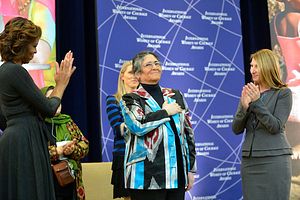Oinikhol Bobonazarova, one of Tajikistan’s best-known human rights advocates and opposition politicians, said in a recent interview with Institute for War and Peace Reporting (IWPR) that the country’s lawmakers are moving backwards with a recent slate of legislation and discussion of laws which she says “fundamentally contravene not only the various international conventions, pacts and treaties that Tajikistan has ratified, but also its constitution and domestic laws.” Moreover, political focus has shifted away from key concerns such as economic crisis and migrant issues.
Bobonazarova currently heads a human rights NGO Perspektiva Plus and has had a broad career as a human rights activist–working with the Organization for Security and Cooperation in Europe (OSCE) and also with the Open Society Foundation. In 2014, she was awarded an International Woman of Courage Award by the U.S. State Department, honoring her for tireless work to “draw attention to women’s rights, torture in detention centers, and the plight of Tajik migrant laborers.” An additional motivation for the award was her futile run for the Tajik presidency in 2013.
Nominated by a coalition of two opposition parties–the Socialist Democratic Party of Tajikistan (SDPT) and the Islamic Renaissance Party of the Tajikistan (IRPT)–Bobonazarova became the first woman nominated for the office. Analysts at the time latched onto the seeming oddity of an Islamist political party–the IRPT–backing a secular female candidate. The nomination underscores what John Heathershaw and David Montgomery have argued, specifically that in Central Asia, political Islam does not oppose the secular state.
Mark Vinson, writing for the Jamestown Foundation at the time, noted the IRPT’s support:
In a statement posted on the IRPT’s website, [prominent cleric and politician Haji Akbar Turajanzoda] defended the nomination by noting that 1) in Islam, a female leader is not prohibited from becoming president in a system of government with separation of powers, which limits executive authority; 2) many conservative Muslim societies, including Pakistan, Bangladesh and Indonesia, have had female heads of state; and 3) she has a strong record of advocating for religious freedom.
Bobonazarova never made it to the election, however, as the coalition failed to register enough signatures. In the latest parliamentary elections in Tajikistan, the IRPT lost all of its seats and has faced growing opposition from the government.
In the years since, she has continued to push for the rights of women, migrants, and prisoners in Tajikistan.
Among the arbitrary laws Bobonazarova mentions are a law on parental responsibility for the education and upbringing of children, which contradicts the constitution and is covered already by the Family Code. She notes that rumors regarding prenuptial medical examinations are founded in propositions put forth by a regional registry office and advocated by at least one parliamentarian. “There was also talk of brides-to-be undergoing virginity tests,” she said in the interview.
Bobonazarova commented that “it is obvious that anything the president says will get done,” going on to finish the interview by referencing the recent flurry of talk regarding Islamic dress in Tajikistan:
In his March 8 address, the president said it was unacceptable for women to wear hijab [Islamic dress]. Immediately, all the public broadcasters began putting out propaganda programmes that argued that hijab was not part of our tradition.
We have massive economic problems, the problems with our migrants, and the current [financial] crisis. But everyone is suddenly concerned about women’s clothing. Apparently that is the most pressing concern. Personally, I don’t think a woman’s clothes are important.
All this shows the way crucially important issues are being left unresolved as the government tries to divert people’s attention in an entirely different direction.
Check out the full interview.
































